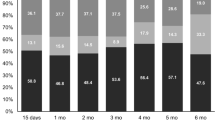Abstract
Purpose
This study investigated the patient perspective during cancer treatment and throughout the survivorship period and to understand how the patient experience may be related to choices for the treatment of gastric cancer.
Methods
Eligible patients in the Vector Oncology electronic medical records database were ≥18 years of age, diagnosed with gastric cancer, and received active treatment. Quality of life (QOL) was collected using the Patient Care Monitor (PCM). Time to deterioration in QOL and overall survival were measured, adjusting for demographic and baseline clinical characteristics. Logistic regression model and classification and regression trees (CART) were used to identify factors associated with treatment choice.
Results
There were 776 patients in this study, of whom 301 (38.8%) reported QOL data. Most patients reported problems on all PCM subscales; problems were more common during the treatment period. Median time to deterioration of PCM subscales ranged from 42 days for treatment side effects to 331 days for impaired performance. Median survival was low: 6.9 and 5.5 months from the start of first- and second-line therapy, respectively. The choices made between therapeutic options were primarily associated with the site at which the oncologist practiced.
Conclusions
Patients with gastric cancer report a considerable number of concerns on all subscales of the PCM, particularly during active treatment periods. The treatment heterogeneity and relative lack of clinical and symptom- or QOL-related factors associated with treatment choice suggest a gap in evidence that must be filled.


Similar content being viewed by others
References
Siegel RL, Miller KD, Jemal A. Cancer statistics, 2016. CA Cancer J Clin. 2016;66(1):7–30.
Karve S et al. Treatment patterns, costs, and survival among Medicare-enrolled elderly patients diagnosed with advanced stage gastric cancer: analysis of a linked population-based cancer registry and administrative claims database. J Gastric Cancer. 2015;15(2):87–104.
Hess, L.M., et al., Chemotherapy treatment patterns, costs, and outcomes of patients with gastric cancer in the United States: a retrospective analysis of electronic medical record (EMR) and administrative claims data. Gastric Cancer, 2015.
Fuchs CS et al. Ramucirumab monotherapy for previously treated advanced gastric or gastro-oesophageal junction adenocarcinoma (REGARD): an international, randomised, multicentre, placebo-controlled, phase 3 trial. Lancet. 2014;383(9911):31–9.
Wilke H et al. Ramucirumab plus paclitaxel versus placebo plus paclitaxel in patients with previously treated advanced gastric or gastro-oesophageal junction adenocarcinoma (RAINBOW): a double-blind, randomised phase 3 trial. Lancet Oncol. 2014;15(11):1224–35.
Al-Batran, S.E., et al., Quality-of-life and performance status results from the phase III RAINBOW study of ramucirumab plus paclitaxel versus placebo plus paclitaxel in patients with previously treated gastric or gastroesophageal junction adenocarcinoma. Ann Oncol, 2016.
Chau I, Passalacqua R, Zalcberg JR, Fuchs CS, Liepa AM, Hsu Y, Schwartz JD, Koshiji M, Tabernero J. Tolerability and quality-of-life (QoL) results from the phase 3 REGARD study: Ramucirumab versus placebo in patients with previously treated gastric or gastroesophageal junction (GEJ) adenocarcinoma. EJC. 2013;4(Suppl 2):S615.
Fortner B et al. Validation of the Cancer Care Monitor items for physical symptoms and treatment side effects using expert oncology nurse evaluation. J Pain Symptom Manag. 2006;31(3):207–14.
Fortner B et al. The Cancer Care Monitor: psychometric content evaluation and pilot testing of a computer administered system for symptom screening and quality of life in adult cancer patients. J Pain Symptom Manag. 2003;26(6):1077–92.
Walker MS et al. Retrospective study of the effect of disease progression on patient reported outcomes in HER-2 negative metastatic breast cancer patients. Health Qual Life Outcomes. 2011;9:46.
Walker MS et al. Symptom burden and quality of life in patients with follicular lymphoma undergoing maintenance treatment with rituximab compared with observation. Ther Adv Hematol. 2011;2(3):129–39.
Norman GR, Sloan JA, Wyrwich KW. Interpretation of changes in health-related quality of life: the remarkable universality of half a standard deviation. Med Care. 2003;41(5):582–92.
Author information
Authors and Affiliations
Corresponding author
Rights and permissions
About this article
Cite this article
Hess, L.M., Cui, Z.L., Wu, Y. et al. Patient Experience After Receiving a Diagnosis of Gastric Cancer in the USA. J Gastrointest Canc 49, 25–34 (2018). https://doi.org/10.1007/s12029-016-9904-7
Published:
Issue Date:
DOI: https://doi.org/10.1007/s12029-016-9904-7




